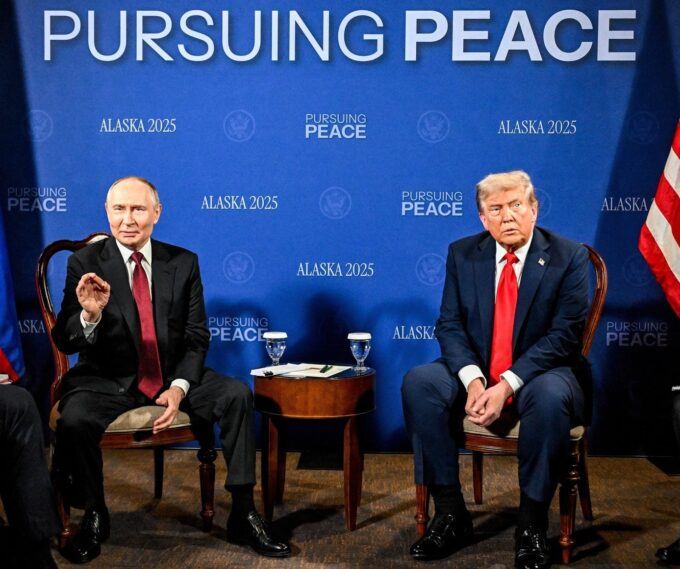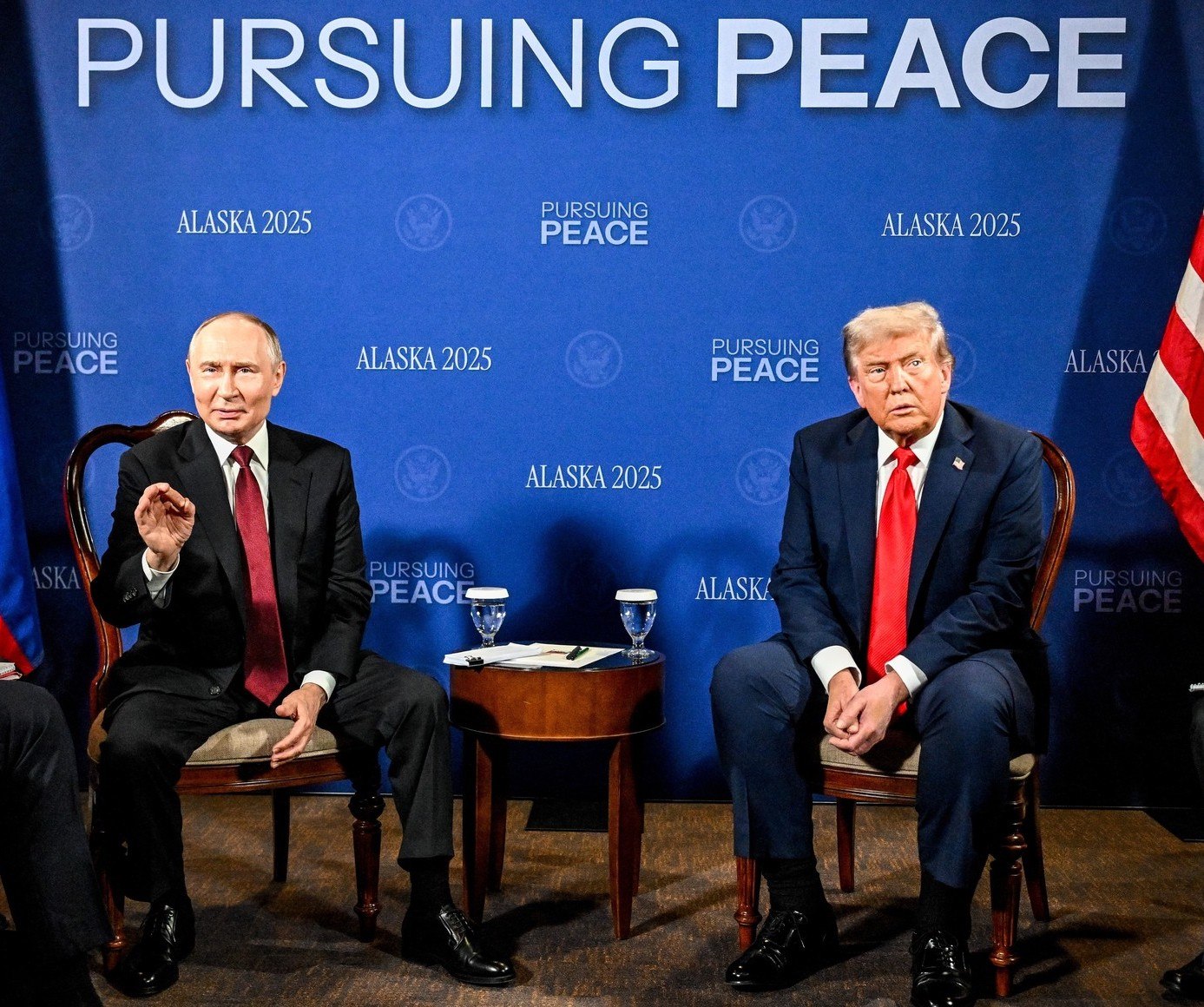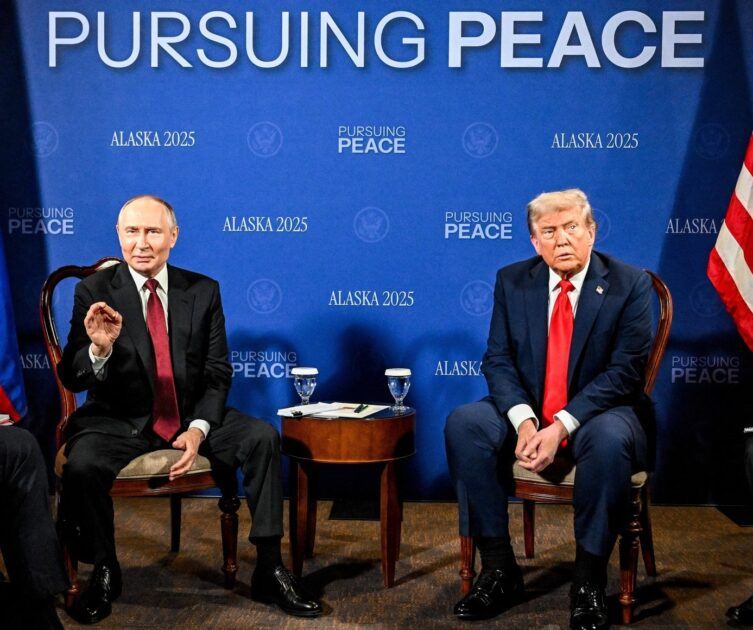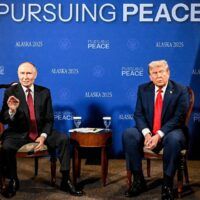


































































Photograph Source: kremlin.ru – CC BY 4.0
Vladimir Putin has been demonized. Not only is the president of the Russian Federation under indictment by the International Criminal Court for war crimes, he has been compared to Hitler, Stalin, and Saddam Hussein. Already in 2012, Reuters cited references to Putin as a “czar-like autocrat,” a “KGB thug,” More recently, after the invasion of Ukraine, Al Jazeera referenced Putin with words like “evil,” “unhinged,” and “unstable.” Should heads of states negotiate with people who are under indictment for war crimes or worse and are called “evil,” “unhinged,” and “unstable”?
One reference to answer the question about negotiating with the evil Putin is Biblical. The Book of Job begins with a casual negotiation between “the Lord” and his sons, including Satan. “The Lord” boasts about “his servant” Job and Job’s piety. Satan replies that the only reason Job is so pious is because he is blessed with success in family and wealth. As Satan notes; “But put forth thine hand now, and touch all that he hath, and he will curse thee to thy face.” That’s the challenge. Will Job remain pious if he is no longer blessed?
And “the Lord” accepts the challenge. “Behold, all that he hath is in thy power, only upon himself put not forth thine hand.” So “the Lord” accepts that Satan could take away all Job’s privileges, but not kill him.
According to the Bible, “The Lord” negotiated with the Devil. Negotiating with the Devil is also the title of a book by the journalist/activist Pierre Hazan – Negotiating with the Devil. Hazan’s argument is that to establish peace in conflict zones requires negotiations with all relevant parties. In a phrase often used by conflict mediators; “If you are part of the problem, you are part of the solution.”
In this sense, there is no question that Putin must be included in negotiations to stop the Russia/Ukraine conflict. Despite Putin’s pariah legal status, with numerous sanctions and obligations by states to arrest him if he enters their territory, the Russian president cannot be ignored. (The United States is under no such obligation to arrest him since it did not sign the Rome Treaty.) Putin must be included in any negotiation. As far as we know, only he can stop the war. So to headline that Putin had already won the negotiations by being invited to the U.S. and regaining legitimacy ignores the necessity of talking to him.
But even assuming Putin to be evil and that negotiating with him is a necessity, it does not follow that he should be treated with great fanfare. It was not necessary, for instance, to give him the royal red carpet treatment when he arrived in Anchorage, Alaska, or to invite him to ride in the presidential vehicle, the Beast. There should be limits on how the Devil is treated.
Also, who is talking to Putin? Mediators are generally neutral, such as delegates of the International Committee of the Red Cross (ICRC). Imagine the moral difficulty of those who negotiated with Slobodan Milosevic about access to prisoners of war during the Yugoslav crisis at the same time they were aware of atrocities being committed by the Serb forces under his control. Negotiating with the Devil does not include being chummy with him.
Which brings me to the role of DJT. Who is Trump to act as mediator in Ukraine/Russia negotiations? He claims he has mediated a truce between Armenia and Azerbaijan, between India and Pakistan, between the Democratic Republic of Congo and Rwanda among several others. His attempts to negotiate peace in larger conflicts such as between Russia/Ukraine and Israel/Palestine are part of his Nobel Peace Prize campaign.
But DJT is not a professional international mediator. Negotiating peace between opposing countries or international groups has become a profession. There are people who have done this as a career in various conflict zones, such as Pierre Hazan. This is not the moment for an amateur to organize a cease-fire or peace agreement between Russia and Ukraine, even the president of the United States. Not only is Trump an amateur diplomatic negotiator, his point man in the Ukraine negotiations and other peace missions, Steven Witkoff, has a background as a real estate investor, quite unlike former American career professional mediators such as Aaron David Miller or Dennis Ross.
(I purposively refrain from mentioning someone who shared a Nobel Peace Prize for “having negotiated a cease fire” in a war that never should have started and that he could have ended earlier then when the fighting finally stopped.)
Beyond neutrality and amateurism, Trump has his own military agenda. He has increased the U.S. military budget beyond any reasonable means and challenged NATO allies to do the same. He is militarizing the domestic U.S. police forces. There is no aspect of peaceful neutrality in all he does. Trump continues to confuse differences between the art of a real estate deal and international diplomacy. One cannot be mediator, guarantor of security (even if it’s only “by air”) and interested financial party all at the same time. Transactionalism has its diplomatic limits.
In addition, if more is necessary; if Trump had arranged some cease-fire deal, he would have taken all the credit. Since the summit was a failure, he returned responsibility for the negotiations to Ukrainian President Zelensky, Europeans and others professionally engaged with the problem. “Now it’s really up to President Zelensky to get it done,” he said after the summit. “I would also say the European nations have to get involved a little bit,” he added.
In typical Trumpian manner, he will never admit defeat. He tried, now it’s for others to continue. No more insisting on a cease-fire. No more if Putin doesn’t agree to some settlement within 10 days there would be “very severe consequences” or a “rough situation.” That’s not how professional mediators act.
A brief mention is also necessary about Trump’s failed diplomacy concerning the specifics of the summit’s negotiations. The announced negotiating time of roughly 3 hours included interpretation. I was told during the Geneva Biden-Putin summit that 3 hours of talk with interpreters actually means 11/4 hours of true negotiations. The lack of serious negotiations in Alaska was also confirmed when neither Putin nor Trump accepted questions at the end of the very short press conference after their meeting.
If DJT is not a diplomatic negotiator, what is he? If you want to demonize Putin, you might also demonize Trump as “evil,” “unhinged,” and “unstable.” That two devils negotiated in Alaska explains the (s) in my title.
The post The Trump-Putin Summit: Negotiating With the Devil(s) appeared first on CounterPunch.org.
This content originally appeared on CounterPunch.org and was authored by Daniel Warner.